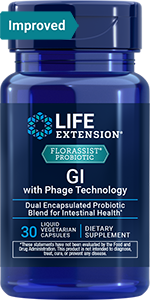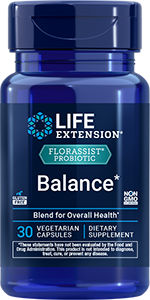
When Is the Best Time to Take Probiotics? Science-Backed Guidance
Published: May 2022 | Updated: November 2025
At a Glance
- Probiotics are an important addition to your supplement routine.
- Consistency is more important than timing when it comes to taking probiotics.
- Like most things, there's no one-size-fits-all for probiotics; follow the science to find the best options for your unique health needs.
Let's be honest—we don't always take our supplements at the exact same time every day. But how much does it really matter?
Well, when it comes to probiotic supplements, it turns out, not much! This isn't the case for many supplements (you don't want to take melatonin in the morning, for example, or a fat-soluble vitamin on an empty stomach), but with probiotics, time of day is not the most important consideration.
That doesn't mean, however, that you don't need to put some thought and strategy into which probiotics you take and when you take them.
We're covering all your questions about how to best take probiotics, whether you need to take them with food, and above all, why consistency matters more than you might think.
What are probiotics?
Whether you're an avid supplement user or just beginning your wellness journey, odds are you're familiar with these health helpers. And while you might know that they are often taken for gut health, here's a more complete explanation of what they are and how they work.
Probiotics have a few defining characteristics:
- They are living microorganisms (including bacteria and yeast) that benefit your health when taken in adequate amounts
- Probiotics can help balance "good" and "bad" bacteria in the gut
- There are many types of probiotics, but there are seven common and frequently present genera
- Benefits are strain-specific, meaning that specific strains will have different beneficial effects on the body (from heart and liver to mood and oral health!)
- Foods like kefir, yogurt, and kimchi may be sources of beneficial, living microbes. However, as they often do not list strains or the amounts, it's often not possible to determine whether they meet the definition of probiotics or not
- Probiotic dietary supplements should list the genus, species and strain, as well as the number of colony-forming units (CFU)
Pro tip: Though many fermented foods tout probiotic benefits, double-check the label on these products. Unless the food contains live cultures of verified probiotic strains, they probably won't provide the exact benefits you're looking for.
Speaking of food…
Should you take probiotics on an empty stomach or with food?
The long and short of it all—it depends. Like we mentioned, every probiotic is different, so there's no one-size-fits-all approach when it comes to exactly how you should take probiotics. This is yet another reason why you always want to read supplement labels and follow the instructions for optimal dosing.
For example, certain probiotic strains used in supplements are more resistant to stomach acid, so in that case it wouldn't really affect the efficacy when taken with or without food. On the flipside, though, if a strain (like some strains of Lactobacillus) is sensitive to stomach acid, it might be smart to take your probiotics with food—although many supplements overcome this challenge with dual-encapsulation or enteric-coated options.
Here's a little guidance if you're still not sure when you should take your probiotics:
| Timing | Potential Upside | Who Should Consider It |
|---|---|---|
| Empty stomach | It may be a more convenient option for those who don't want to time taking supplements around their eating schedule |
|
| With food | Supplementing with food may enhance bacterial survival of beneficial probiotics during GI transit |
|
But when it comes down to it, your best bet, like with any supplement, is going to be taking it as directed on the label. More often than not though you probably won't get specific instruction either way. Just try and take your probiotics at the same time every day so you're more likely to remember to actually take it.
And at the end of the day, consistency is key for getting the most out of anything, whether it's exercising, eating well, or taking your supplements.
Explore Our Best Prebiotic & Probiotic Supplements
Does taking probiotics in the morning vs. at night make a difference?
Much like taking a probiotic with food versus an empty stomach, the data doesn't show that one is better than the other, so when it comes down to it, the timing doesn't really make a difference. Whatever time of day (or night) makes it easier for you to stick to your routine is the perfect time to take a probiotic!
Though, and we cannot stress this enough, the best way to take a supplement is as directed on the label. If there are specific instructions, it typically reflects the best way to take it based on what was determined in clinical studies.
Still unclear about what would be best for you? Here's a few potential upsides that can help you make a decision.
| Timing | Potential Upside | Who Should Consider It |
|---|---|---|
| Morning |
|
|
| Night |
|
|
Whatever time you choose, a good rule of thumb is to simply take your probiotics at the same time every day.
Do different probiotic strains have different timing needs?
You guessed it! Since each probiotic strain is unique, their timing needs may or not be different. For example, oral health probiotics may be more effective after brushing and flossing.
But, generally speaking, if specific timing yielded a clinically significant effect, the directions would likely already incorporate best use instructions to mitigate any unwanted effects of taking it.
That being said, if the directions are very general, then it's likely that the timing of taking that specific probiotic strain hasn't been shown in clinical studies to make a difference.
How can you take probiotics consistently for the best results?
This is going to come down to daily habits. A few ways you can make it easier to take your probiotics consistently include:
- Set an alarm on your phone specifically for taking supplements
- Lay your supplement stack out every day
- Plan your supplements around other daily habits (i.e., before or after a workout)
FAQs
What is the difference between pro- and prebiotics?
Prebiotics are food components, such as some non-digestible dietary fibers, that gut microbes feed on and use to grow. This is a big reason why prebiotics and probiotics are often paired together for gut health support.
Think about prebiotics like adding fertilizer to the soil of your plants to help them grow. Sure, with proper care, your plants will still grow and stay healthy, but the fertilizer optimizes the benefits that are already there, and plants can use it to grow more easily. Simply put, prebiotics act as food for healthy gut microbes.
How long should I take probiotics for results?
Probiotics are an important staple for everyday health. Just like multivitamins and fish oil, they should be a mainstay of your routine. As far as when you notice any difference, like most of what we've already covered, this is going to vary from probiotic to probiotic. Be sure to follow the clinical studies on the strains for the best results.
And if you don't see results overnight, don't be discouraged. You usually need to take probiotics consistently for several weeks to feel the effects.
Do probiotics work immediately after taking them?
Like we just covered, you're going to have to be consistent to see measurable results. This could mean several days, weeks, or even months.
Want to figure out what's the best probiotic for you? Take this quiz for personalized suggestions!
Key Takeaways
- Different probiotics offer varying health benefits depending on the strain.
- Most of the time, when you take probiotics comes down to preference.
- It might be smart to take prebiotics alongside your probiotics.
- Staying consistent with your supplements will yield the best long-term benefits.
References
- Dahiya D, Nigam PS. "The Gut Microbiota Influenced by the Intake of Probiotics and Functional Foods with Prebiotics Can Sustain Wellness and Alleviate Certain Ailments like Gut-Inflammation and Colon-Cancer." Microorganisms. March 2022. https://pubmed.ncbi.nlm.nih.gov/35336240/
- Kaczmarek JL, et al. "Time of day and eating behaviors are associated with the composition and function of the human gastrointestinal microbiota." Am J Clin Nutr. November 2017. https://pubmed.ncbi.nlm.nih.gov/28971851/
- Vinderola G. "Effects of the food matrix on probiotic's efficacy: how much should we care?" ISAPP. June 2025. https://isappscience.org/food-matrix-probiotic-efficacy/
- Yadav MK, et al. "Probiotics, prebiotics and synbiotics: Safe options for next-generation therapeutics." Appl Microbiol Biotechnol. January 2022. https://pmc.ncbi.nlm.nih.gov/articles/PMC8749913/
- "Probiotics." ISAPP. https://isappscience.org/topic/probiotics/?pg=3
- "Probiotics." National Institutes of Health. March 2025. https://ods.od.nih.gov/factsheets/Probiotics-HealthProfessional/
- "Probiotics: Usefulness and Safety." National Center for Complementary and Integrative Health. August 2019. https://www.nccih.nih.gov/health/probiotics-usefulness-and-safety
Always be in the know!
Access the latest deals, wellness news, expert health tips & more!











